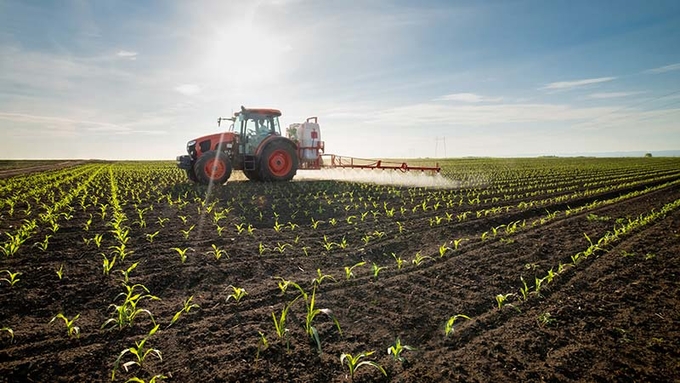June 20, 2025 | 01:09 GMT +7
June 20, 2025 | 01:09 GMT +7
Hotline: 0913.378.918
June 20, 2025 | 01:09 GMT +7
Hotline: 0913.378.918

Agritech startup Nitricity provides hands-on technology that allows for farmers to make and inject their own nitrogen compounds directly into the fertilizer and soil.
Nitricity, the agtech startup revolutionizing nitrogen fertilizer production, announced today the close of its Series A investment capital raise at $20 million. This fundraising round was led by Khosla Ventures and Fine Structure Ventures with additional participation from Energy Impact Partners, Lowercarbon Capital, and MCJ Collective.
Nitricity electrifies and distributes the production of nitrogen fertilizer. The Nitricity approach uses a new technology for regionalized nutrient production using low-cost solar or wind. This marks a major difference from the existing nitrogen supply chain, which is highly centralized and uses fossil fuels and costly transportation.
“This fundraising round brings us one step closer toward sustainable and locally produced fertilizer,” said Nicolas Pinkowski, CEO and co-founder of Nitricity. “It’s time to bring this to market. We have aggressive growth plans in motion.”
With this financing, Nitricity has raised $27 million in total funding to date. This will accelerate its ability to bring climate-smart fertilizer to a market experiencing ongoing and historic fertilizer price volatility and supply challenges.
“This electrified technology provides fertilizer in a climate-smart nitrate form, designed for efficient application, allowing it to address greenhouse gas emissions beyond ammonia-based technologies,” said Joshua McEnaney, president, CTO and co-founder at Nitricity. “This is an opportunity to attack not just the 1-2% of global GHG emissions in the production, but the additional 5% of GHG emissions in the application by mitigating nitrous oxide formation. We are pushing hard to scale up and implement this solution.”
Nitricity’s technology has been proven in commercial-scale farming operations through multiple functional pilots, including sub-surface fertigation of tomatoes in a collaboration with California State University Fresno’s Center for Irrigation Technology and the Water, Energy and Technology Center. Through solar-fertilizer technology, Nitricity has demonstrated the power of its system to produce and apply nitrogen fertilizer closer to the end-user – unlike any other fertilizer system today.
“Today’s fertilizer industry is facing the perfect storm of high GHG emissions, high fossil fuel consumption, rising costs and geopolitical disruptions,” said Rajesh Swaminathan, partner at Khosla Ventures. “Nitricity’s decentralized approach to manufacturing fertilizers using just air, water and renewables-based electricity was born out of a vision to completely transform a 100-year-old industry, and we are excited to be partnering with them.”
“Nitricity has made rapid progress since our initial investment in their Seed round,” said Allison Hinckley, senior associate at Fine Structure Ventures, a venture capital fund affiliated with FMR LLC, the parent company of Fidelity Investments. “In response, we are increasing our support of the company to aid in bringing their differentiated, decarbonized fertilizer products to market in the near term.”
Nitricity aims for its renewable technology to be available in the market and benefitting the entire value chain within a two-year period.
Fertilizers are one of the most important products in the farming industry to increase crop yields and improve the quality of soil. Nitricity is an agritech startup that is helping farmers create their own nitrogen fertilizer on-site for more sustainable farming. The company recently announced new seed round funding to help expand its own business and improve upon current operations.
The Nitricity process for production in farming begins with the agritech startup installing its technology directly onto the farm. Next, the company works directly with farmers to help customize its nitrogen output and specific compounds to the needs of the crops being grown.
The company’s technology takes in energy from solar panels and then injects its own nitrogen fertilizer compounds directly into the already established irrigation system. Using irrigation systems to inject the fertilizer compounds serves as a more cost-effective way for a business to reach all of its crops instead of having to purchase large levels of nitrogen fertilizers from a wholesaler. As a result, the long-term use of the agritech startup technology ends up saving farmers money no matter what.
(California Agtoday)

(VAN) Poultry production in Poland, which has only started recovering from devastating bird flu outbreaks earlier this year, has been hit by a series of outbreaks of Newcastle disease, with the veterinary situation deteriorating rapidly.

(VAN) Extensive licensing requirements raise concerns about intellectual property theft.

(VAN) As of Friday, a salmonella outbreak linked to a California egg producer had sickened at least 79 people. Of the infected people, 21 hospitalizations were reported, U.S. health officials said.

(VAN) With the war ongoing, many Ukrainian farmers and rural farming families face limited access to their land due to mines and lack the financial resources to purchase needed agricultural inputs.

(VAN) Vikas Rambal has quietly built a $5 billion business empire in manufacturing, property and solar, and catapulted onto the Rich List.

(VAN) Available cropland now at less than five percent, according to latest geospatial assessment from FAO and UNOSAT.

(VAN) Alt Carbon has raised $12 million in a seed round as it plans to scale its carbon dioxide removal work in the South Asian nation.